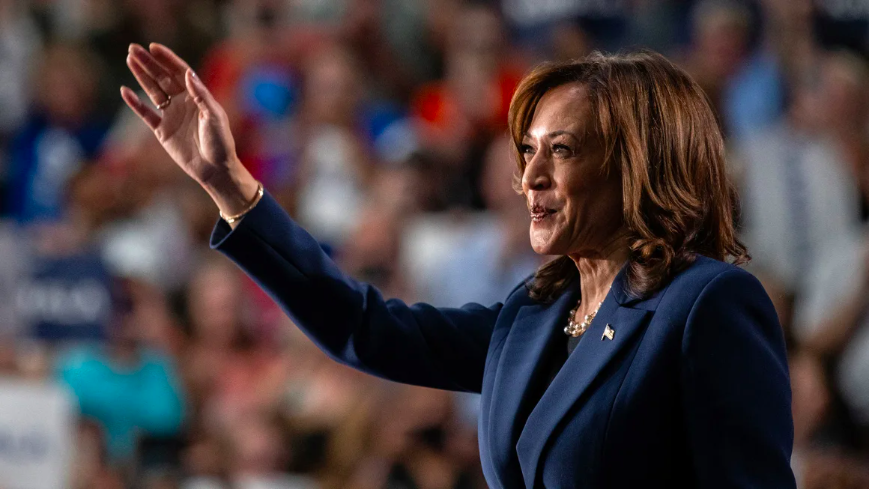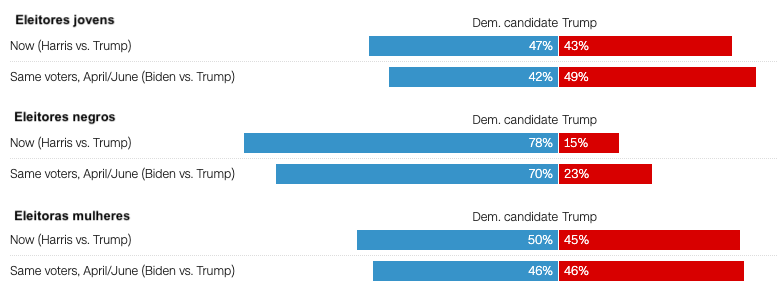
Published 24/07/2024 15:29 | Edited 24/07/2024 16:14
Vice President Kamala Harris has opened up a two-percentage-point lead over Republican Donald Trump, according to the latest Reuters/Ipsos poll. The surge comes after President Joe Biden announced he had ended his re-election campaign and switched his support to Harris. Another CNN poll doesn’t show a clear lead, but Harris is outperforming Biden against Trump.
The new Reuters/Ipsos poll, conducted on Monday and Tuesday, followed the Republican National Convention, where Trump formally accepted the party’s nomination on Thursday, and Biden’s announcement on Sunday declaring his support for Harris. In the national poll, she leads Trump 44% to 42%, a margin of error of 3 percentage points.
The shift represents a reversal from last week’s poll, which showed Biden facing a two-percentage-point deficit against Trump before he dropped out of the race. Previous polls showed a tight race: Biden and Trump were tied at 44 percent in a July 15-16 poll, and Trump led by one percentage point in a July 1-2 poll, both within the margin of error.
While national polls offer insights into overall support for candidates, the outcome of the US presidential election is decided indirectly by the Electoral College, where competitive states play a crucial role. As a result, Kamala’s overwhelming support in major cities like New York, Chicago or Los Angeles is undermined by the conservatism of sparsely populated states that could elect just as many delegates.
A Trump campaign pollster downplayed the significance of the surge in support for Harris, suggesting that she would likely experience a temporary boost in popularity due to the widespread media coverage of her new candidacy. “This surge is likely to start to show in the coming days and last for a while,” Tony Fabrizio said in a memo distributed by the Trump campaign. Traditionally, candidates expect a surge after formally accepting their party’s nomination in televised conventions, but the poll showed no clear signs of that for Trump.
The latest Reuters/Ipsos poll highlighted the case for Biden to drop out of the race and pass the torch to Harris. Some 56% of registered voters agreed that Harris, 59, was “mentally sharp and capable of handling challenges,” compared with 49% who said the same about Trump, 78. Only 22% of voters rated Biden that way.
Biden ended his reelection bid after a debate with Trump in which he struggled, stuttering frequently and failing to aggressively challenge Trump’s attacks, which included false information. About 80% of Democratic voters said they viewed Biden favorably, compared with 91% who had the same view of Harris. Three-quarters of Democratic voters agreed that the party should support Harris now, while a quarter believed that multiple candidates should compete for the party’s nomination.
When a hypothetical ballot included independent presidential candidate Robert F. Kennedy Jr., Kamala led Trump 42 percent to 38 percent, a lead outside the margin of error. Kennedy, favored by 8 percent of voters in the poll, has yet to qualify for the ballot in many states ahead of the Nov. 5 election.
Harris campaigned in the battleground state of Wisconsin on Tuesday, winning support from key party figures. Attention now turns to who she will choose as her running mate. Many respondents to the Reuters/Ipsos poll said they were unfamiliar with the Democrats seen as potential choices to join her ticket. About one in four registered voters had never heard of U.S. Transportation Secretary Pete Buttigieg, who had the highest favorability rating — 37 percent — among potential running mates. One in three had never heard of California Gov. Gavin Newsom, with nearly the same share viewing him favorably. Half of registered voters in the poll had never heard of Arizona Sen. Mark Kelly, and two-thirds were unfamiliar with Kentucky Gov. Andy Beshear.
The online survey interviewed 1,241 U.S. adults across the country, including 1,018 registered voters.
CNN/SSRS
As a new CNN poll conducted by SSRSA points out, the race between Kamala and Trump begins without a clear leader. This comes after President Joe Biden ended his re-election bid and passed the torch to Kamala.
According to the poll, Trump has 49% support among registered voters nationwide, while Kamala has 46%, a difference within the margin of sampling error. This represents a tighter race than previous CNN polls comparing Biden and Trump.
Voters are broadly supportive of both Biden’s decision to step down and his remaining in office for the remainder of his term. Among Democrats, there is enthusiasm for Harris, with a majority willing to rally behind her, even as there is division over whether Biden’s successor should continue his policies or chart a new path.
The survey, conducted online on July 22 and 23, interviewed registered voters who had previously participated in CNN polls in April or June. In previous polls, Trump led Biden by 6 points in a head-to-head matchup. Rechecking the same people suggests that shifts in preferences are more likely to reflect real changes over time, not just statistical fluctuations.
Comparison chart between scenarios with Biden and Kamala against Trump:

The new poll reveals some critical shifts in the early days of the race between Harris and Trump. She retains 95 percent of voters who previously supported Biden, while Trump retains the support of 92 percent of his previous supporters. Those who previously supported neither Biden nor Trump are now split 30 percent for Harris and 27 percent for Trump, with the rest either voting for another candidate or opting out of the election.
Among Kamala’s voters, 50% say they are voting for her rather than against Trump, a significant shift from the Biden-Trump race, where only 37% of Biden voters said the same. By contrast, 74% of Trump voters say they are voting to support him, up from 66% in CNN’s June poll.
The poll also indicates that Trump’s support among his strongest groups remains stable, even with the change in opponent: 67% of white voters without a college degree support him against Harris, nearly identical to their support against Biden (66%). He maintains the support of a majority of men (53% against Harris, 54% against Biden) and of about 9 in 10 Republicans and Republican-leaning independents (90% against Harris, 89% against Biden).
The shift toward affirmative support for Harris comes from traditionally Democratic groups that have been problematic for Biden’s campaign. Among Harris voters under 45, 43% say they will vote for her, compared with 28% of Biden voters. Among nonwhite voters who support Harris, 57% say they will vote for her, compared with 48% of Biden voters. And 54% of women who support Harris say they will vote for her, compared with 43% of women who support Biden.
These groups are partly responsible for Harris’s gains in the polls over Biden. Among voters under 35, 49% supported Trump and 42% Biden in April or June, but now 47% support Harris and 43% Trump. Black voters, who were previously split 70% for Biden and 23% for Trump, are now split 78% for Harris and 15% for Trump. Among Hispanic voters, the previous split of 50% for Trump and 41% for Biden is now nearly even, with 47% for Harris and 45% for Trump. Women, who were split 46% for Biden and 46% for Trump, are now split 50% for Harris and 45% for Trump.
Independent voters, who previously split 47% for Trump and 37% for Biden, now split 46% for Trump and 43% for Harris. This narrowing gap is driven in part by increased support for Harris among Democratic-leaning independents, with 90% of that group now supporting Harris, compared to 81% who supported Biden.
The poll was conducted as Democratic politicians and delegates quickly rallied around Harris as the party’s likely nominee. About three-quarters of Democratic voters (76%) say the party should nominate Harris, with just 6% supporting another candidate.
Democratic voters express broadly positive views of Kamala, with three-quarters or more saying they would be proud of her as president (86%), agree with her on most important issues (84%), believe she represents the future of the party (83%), that she will unite the country (77%) and that she has a good chance of defeating Trump (75%).
The CNN poll, conducted by SSRS between July 22 and 23, included a random national sample of 1,631 registered voters who participated in CNN polls in April or June. Interviews were conducted online or by telephone with a live interviewer. The margin of sampling error is plus or minus 3.0 percentage points.
Source: vermelho.org.br

